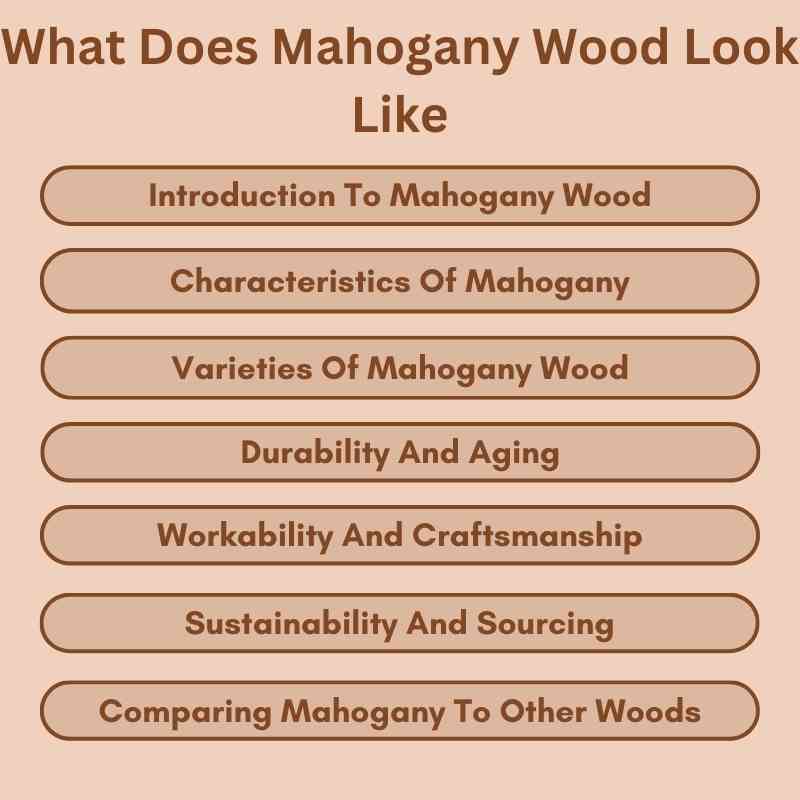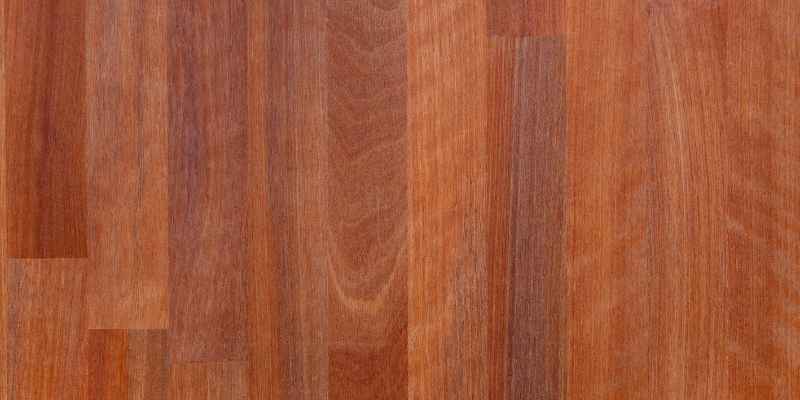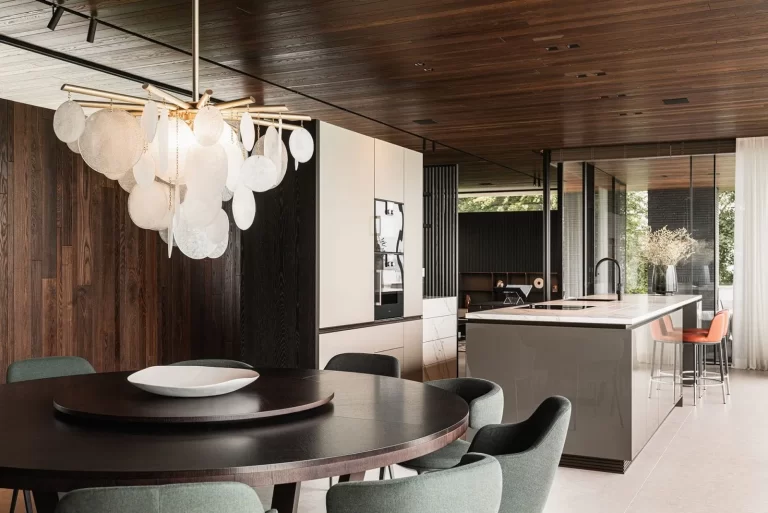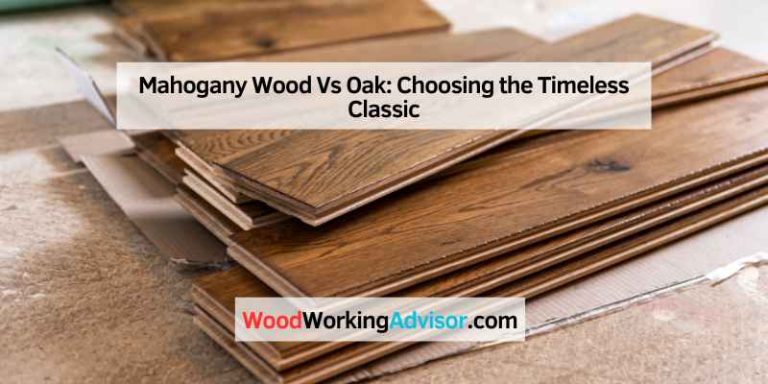What Does Mahogany Wood Look Like? Unveil Its Elegance!
Mahogany wood features a rich, deep reddish-brown color with a straight grain. Its smooth texture and natural luster make it visually appealing.
Mahogany is a premium hardwood known for its beauty and durability. Originating from tropical regions, this wood has been a favorite for furniture and cabinetry. Its warm tones can vary from light to dark, often showcasing a distinctive grain pattern.
Craftsmen appreciate mahogany for its workability and resistance to rot, making it ideal for both indoor and outdoor applications. Many people choose mahogany for heirloom pieces due to its longevity. Understanding what mahogany wood looks like helps in making informed choices for home decor and woodworking projects. This wood type not only enhances aesthetics but also adds value to any space.
Introduction To Mahogany Wood
Mahogany wood is famous for its beauty and durability. It is a rich, reddish-brown color. Many people admire its fine grain and smooth texture. This wood has a long history and many uses.
Origins And Historical Significance
Mahogany originates from tropical regions. It is mainly found in Central America and the Caribbean. The wood has been valued for centuries.
- Used by ancient civilizations for furniture
- Popular during the colonial era
- Symbol of luxury and status
In the 18th century, mahogany became a favorite among craftsmen. Its strength and workability made it ideal for fine furniture. Today, it remains a sought-after material.
Common Uses In Today’s World
Mahogany is versatile and used in various applications. It is popular in both residential and commercial settings.
| Use | Description |
|---|---|
| Furniture | Beautiful tables, chairs, and cabinets |
| Musical Instruments | Guitars and pianos benefit from its sound properties |
| Boat Building | Resistant to water and decay |
| Decorative Items | Carvings and sculptures showcase its beauty |
Mahogany wood is also used for flooring and cabinetry. Its rich color adds warmth to any space. Many craftsmen choose mahogany for its elegance and longevity.

Characteristics Of Mahogany
Mahogany wood is known for its rich beauty and durability. It has unique features that set it apart from other woods. Below, we explore its main characteristics.
Color Palette
The color of mahogany can vary greatly. It typically ranges from a light pinkish-brown to a deep, dark reddish-brown. Here’s a quick overview:
| Color Shade | Description |
|---|---|
| Light Brown | Subtle and soft, ideal for a warm look. |
| Medium Reddish-Brown | Classic mahogany, popular for furniture. |
| Dark Reddish-Brown | Rich and elegant, adds depth to any space. |
Grain Patterns And Texture
Mahogany features a fine and even grain. It can have straight or interlocked patterns. The texture is smooth, making it easy to finish and polish. Key points about its grain:
- Fine grain provides a sleek appearance.
- Interlocked grain adds unique visual interest.
- Polished surfaces shine beautifully.
Weight And Density
Mahogany is a dense and heavy wood. This density contributes to its durability. Here are some details:
- Average weight: 35-45 lbs per cubic foot.
- High density enhances strength.
- Ideal for furniture and cabinetry.
Varieties Of Mahogany Wood
Mahogany wood comes in several varieties. Each type has unique features. Understanding these differences helps in choosing the right mahogany.
African Vs. South American Mahogany
African and South American mahogany are the two main types. They have distinct characteristics that set them apart.
| Feature | African Mahogany | South American Mahogany |
|---|---|---|
| Color | Light reddish-brown | Deep reddish-brown |
| Grain | Straight grain | Interlocking grain |
| Durability | Moderately durable | Highly durable |
| Cost | Generally less expensive | Typically more expensive |
African mahogany is lighter in color. It has a straight grain pattern. South American mahogany has a richer color. Its grain often appears more complex.
Distinguishing Between Species
Many mahogany species exist. Each has unique traits. Here are some common types:
- Swietenia macrophylla – Known as Honduras mahogany. It’s the most sought after.
- Khaya anthotheca – Often called African mahogany. It’s less expensive.
- Swietenia mahagoni – Also known as Cuban mahogany. It’s rare and valuable.
To identify mahogany species:
- Check the color and grain.
- Look for durability features.
- Research the source location.
Each species offers something unique. Knowing these differences helps in making informed choices.
Durability And Aging
Mahogany wood is renowned for its strength and longevity. Its durability makes it a favorite for furniture and flooring. Understanding how it ages is crucial for maintaining its beauty. This section explores two essential aspects: resistance to decay and color changes over time.
Resistance To Decay
Mahogany has excellent resistance to decay. This quality stems from its dense grain. Here are some reasons why it resists decay:
- Natural Oils: Mahogany contains oils that repel moisture.
- Dense Structure: Its tight grain prevents fungal growth.
- Insect Resistance: Mahogany is less prone to damage from pests.
These features make mahogany ideal for outdoor furniture. It lasts longer than many other woods, even in humid climates.
Color Changes Over Time
As mahogany ages, its color evolves beautifully. Initially, it appears as a rich reddish-brown. Over time, it deepens to a darker hue. This natural aging process enhances its aesthetic appeal.
| Time Period | Color Description |
|---|---|
| New | Light Reddish-Brown |
| 5 Years | Medium Reddish-Brown |
| 10 Years | Dark Reddish-Brown |
Sunlight plays a role in this transformation. Direct exposure can accelerate color changes. Regular maintenance helps preserve the rich tones.
Understanding these aspects helps in making informed choices. Mahogany’s durability and aging process add to its overall value.
Workability And Craftsmanship
Mahogany wood is a favorite among craftsmen. Its beautiful grain and rich color make it ideal for various projects. This wood is easy to work with, allowing for precise cuts and stunning finishes.
Ease Of Cutting And Shaping
Mahogany wood is known for its excellent workability. Here are some key points:
- Softness: Mahogany is softer than many hardwoods.
- Tools: It cuts easily with both hand and power tools.
- Shaping: It shapes well without splintering.
Carpenters appreciate mahogany for its:
- Ease of carving.
- Ability to hold details.
- Stable nature during shaping.
Finishing And Staining
Finishing mahogany enhances its natural beauty. Here’s what to know:
| Finish Type | Description |
|---|---|
| Oil Finish | Brings out the grain and adds depth. |
| Lacquer | Provides a glossy, durable finish. |
| Stain | Available in various colors to match your project. |
Mahogany accepts stain well. This wood showcases colors beautifully. Proper finishing protects against wear and tear.
Sustainability And Sourcing
Understanding the sustainability and sourcing of mahogany wood is essential. This beautiful wood has a rich history but poses some environmental concerns. Responsible sourcing helps protect forests and wildlife.
Environmental Impact
Mahogany wood comes from tropical rainforests. These forests are vital for our planet. Deforestation threatens biodiversity and climate stability. Here are some key impacts:
- Loss of habitats for endangered species
- Increased carbon emissions
- Soil erosion and degradation
Choosing sustainably sourced mahogany can help mitigate these issues. Responsible harvesting practices maintain forest health.
Certified Sustainable Options
Many organizations certify sustainable wood sources. Look for certifications like:
| Certification | Description |
|---|---|
| FSC | Forest Stewardship Council – Ensures responsible management of forests. |
| PEFC | Programme for the Endorsement of Forest Certification – Promotes sustainable forest management. |
Choosing certified mahogany supports responsible forestry practices. It protects ecosystems and promotes biodiversity.
Consumers play a vital role in sustainability. Selecting certified products encourages responsible sourcing. Make informed choices for a healthier planet.
Comparing Mahogany To Other Woods
Mahogany wood stands out among various hardwoods. Its rich color and durability appeal to many. Comparing it to other woods helps understand its unique features. This section explores how mahogany measures up against other popular hardwoods.
Pros And Cons Against Other Hardwoods
Understanding the pros and cons of mahogany helps in making informed decisions. Here’s a quick comparison:
| Wood Type | Pros | Cons |
|---|---|---|
| Mahogany |
|
|
| Oak |
|
|
| Maple |
|
|
Price Considerations
Price is a vital factor in choosing wood. Here’s a comparison of prices for mahogany and other hardwoods:
| Wood Type | Average Price per Board Foot |
|---|---|
| Mahogany | $8 – $15 |
| Oak | $3 – $7 |
| Maple | $4 – $10 |
Mahogany is often more costly than oak or maple. Consider budget and project needs. Investing in mahogany offers beauty and longevity, making it worth the price.
Caring For Mahogany Furniture
Caring for mahogany furniture keeps it beautiful and lasting. This rich, dark wood needs special attention. Proper care helps maintain its stunning appearance.
Cleaning And Maintenance Tips
Regular cleaning keeps mahogany furniture looking fresh. Follow these simple steps:
- Use a soft, dry cloth to dust.
- For spills, wipe immediately with a damp cloth.
- Never use harsh chemicals or abrasive cleaners.
Apply a quality furniture polish every few months. This enhances the wood’s natural shine. Avoid excess moisture, as it can damage the wood.
Repairing Scratches And Damage
Scratches happen, even on the finest furniture. Here are some easy repair methods:
- For light scratches, use a matching furniture crayon.
- Rub the crayon gently over the scratch.
- For deeper scratches, use a wood filler that matches.
- After it dries, sand it smooth and polish.
Always test any repair method on a hidden area first. This ensures no further damage occurs.
Real-life Examples And Gallery
Mahogany wood is famous for its beauty and durability. It has rich colors that change with light. This section showcases stunning real-life examples of mahogany wood. Enjoy the visual appeal and craftsmanship.
Iconic Mahogany Pieces
Many iconic pieces of furniture highlight the beauty of mahogany. Here are some noteworthy examples:
- Antique Mahogany Dining Table: A classic centerpiece for any dining room.
- Mahogany Cabinets: Elegant storage solutions with intricate designs.
- Mahogany Desks: Perfect for a sophisticated home office.
- Mahogany Chairs: Comfortable seating with timeless style.
- Musical Instruments: Guitars and pianos crafted from mahogany produce rich tones.
Photo Gallery Of Mahogany Woodworks
Explore the stunning beauty of mahogany through this curated photo gallery:

Frequently Asked Questions
What Is The Color Of Mahogany Wood?
Mahogany wood is known for its rich reddish-brown color. This hue can deepen over time, enhancing its beauty. The wood often features a fine grain, which adds to its luxurious appearance. Its consistency in color makes it a popular choice for high-end furniture and cabinetry.
How Durable Is Mahogany Wood?
Mahogany wood is highly durable and resistant to decay. It withstands changes in temperature and humidity well, making it suitable for various climates. This durability also allows it to last for generations with proper care. Its strength makes it ideal for furniture, flooring, and musical instruments.
Is Mahogany Wood Easy To Work With?
Yes, mahogany wood is relatively easy to work with. Its fine grain allows for smooth cutting, shaping, and finishing. Carpenters and woodworkers appreciate its stability during the crafting process. This ease of work contributes to its popularity in both amateur and professional woodworking projects.
What Are Common Uses For Mahogany Wood?
Mahogany wood is commonly used for furniture, cabinetry, and musical instruments. Its beauty and durability make it a favorite for high-quality items. Additionally, it’s often used in boat building due to its resistance to water damage. Its versatile nature suits both functional and decorative applications.
Conclusion
Mahogany wood is truly a stunning choice for furniture and décor. Its rich color and unique grain patterns make it stand out in any setting. Whether you prefer a classic or modern aesthetic, mahogany adds warmth and elegance. Embrace this beautiful wood to enhance your living space with timeless charm.







